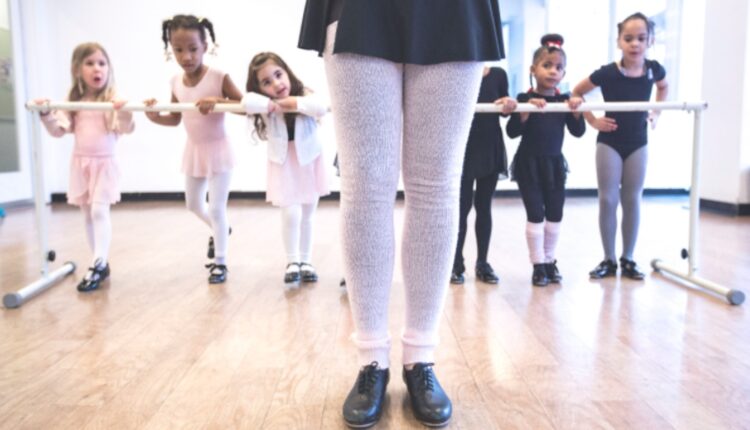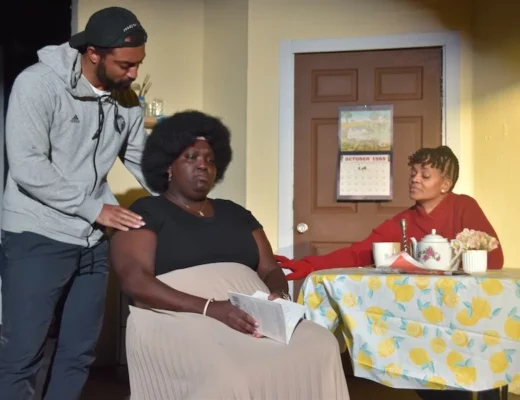By Kelly McDonnell
This article was first published March 2, 2021 in The DC Line here.
Summer 2020 ignited change for the Joy of Motion Dance Center, a DC-based nonprofit. Financial hardship caused by the coronavirus pandemic prompted the closure of two of the center’s studios. The organization’s reckoning with racist experiences faced by staff and dancers of color led to an overhaul of Joy of Motion’s board of directors last fall.
A change.org petition with almost 5,000 signatures called for leadership changes at Joy of Motion. Started in June, the petition cited multiple instances in which leaders had allegedly body-shamed dancers and unfairly discriminated against Black instructors. The previous board of directors stepped down on Oct. 16.
Carol Foster is now chair of Joy of Motion’s board of directors and the first Black woman to hold the position. Foster has also worked on projects with the National Endowment for the Arts and the DC Commission on the Arts and Humanities. She currently serves on the Kennedy Center’s Culture Caucus, which organizes events that mostly take place at the center’s REACH campus.
“People have to trust that there is change afoot at Joy of Motion,” Foster said in an interview with The DC Line. “It’s really critical right now for Joy of Motion, because of the pandemic, because of all of the racial issues that came out, that … you have to be accountable through action.”
Foster said she wasn’t surprised to see the petition or the incidents cited in it, and she doesn’t believe anyone in the Black community at Joy of Motion was surprised by it either. Last summer’s Black Lives Matter protests of the killing of Black people by police officers following the deaths of George Floyd, Breonna Taylor and Tony McDade were a catalyst for the petition, Foster said.
“What Black Lives Matter did was give [Black] people a way to be comfortable to say what’s on our mind. People need to be called out,” Foster said.
Krystal Odom, who has worked at Joy of Motion for 15 years, is the organization’s new interim executive director. She is the first Black woman in the position.
Odom said the petition was “necessary” for the organization to improve. Odom has taught ballet and hip-hop with Joy of Motion Dance Center, and she wants to include more instruction in dance history in the group’s classes and programming. After having eliminated two locations, Joy of Motion continues to operate a partner studio at the Atlas Performing Arts Center on H Street NE, as it has since 2005. Joy of Motion’s virtual programming for youth and adults includes drop-in classes, multi-week courses and on-demand recordings. The organization will be scheduling events such as webinars, film screenings and guest artist classes, and it recently held a busy slate of President’s Day Weekend workshops
“It’s important for students who come into our virtual space, our physical space to relearn where dance styles originate from. … It helps them to be able to look at [other dancers] in ways they didn’t before,” Odom said.
Since taking over, the new leadership at Joy of Motion has done anti-racism professional development training and created procedures for faculty, staff and students to report “concerns regarding equity, discrimination, and safety,” according to a press release from the organization. Concerns will be addressed using a “restorative justice” model, the press release said.
Odom said conversations about anti-racism, discrimination and privilege hadn’t taken place in the past at Joy of Motion. She’s hopeful that these continuing, sometimes uncomfortable, discussions will improve leadership and studio practices.
Coinciding with the leadership shakeup, Joy of Motion also announced the closure of two of its three centers.
The Friendship Heights studio and theater, which had been open for more than 30 years at 5207 Wisconsin Ave. NW, closed in September after the landlord decided not to renew the organization’s lease, Foster said. Odom added that Joy of Motion had experienced a difficult relationship with its landlord in recent years.
The Bethesda studio space at 7315 Wisconsin Ave. closed at the end of November due to financial constraints.
Odom said that the demise of these studios will unfortunately distance the organization from many of its participants. The Friendship Heights studio served Joy of Motion’s largest adult population, while the Bethesda studio hosted three conservatory-style programs for youth dancers.
With only one open studio and pandemic restrictions on in-person classes still in place, Joy of Motion now serves — virtually for now — about 113 students weekly, compared to over 1,200 students before the pandemic began, according to the nonprofit’s website.
The pandemic has hit small businesses and nonprofits particularly hard, Foster said. Joy of Motion has received financial support from the DC Commission on the Arts and Humanities as well as a loan from the federal Paycheck Protection Program. But the racial issues at Joy of Motion and the financial strain of the pandemic have negatively impacted donations, she added.
“No matter what, you try to keep your doors open,” Foster said.
In a Dec. 1 post on the Joy of Motion website, the organization reported that “tuition from enrollment, grants, and individual donations have significantly decreased leaving a monthly shortfall of approximately $100,000.” Joy of Motion received only about $500 in individual contributions in September, October and November. The organization didn’t respond to requests for an update about how fundraising has gone since then, but a mid-December appeal on Joy of Motion’s Facebook page said that despite reduced expenditures “our organization is still in desperate need of an infusion of financial support in order to maintain operations.”
It hasn’t been easy making so many changes under such financially stressed, racially charged and socially distanced circumstances, both Odom and Foster said. But the organization is eager to keep rebuilding while incorporating conscious changes that better the community and ensure that “dance is for everyone,” Foster said.
“We don’t want to dwell on what has happened,” Odom said, “but we don’t want to forget.”





No Comments